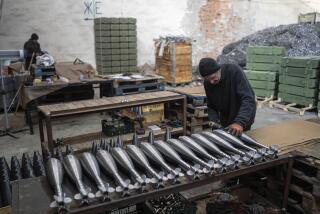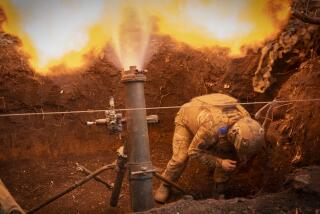Bulgaria Seeks Economic Boost in Arms : Eastern bloc: Some officials say armament exports remain far below the 1980s. They predict inefficient factories will have trouble competing in the world market.
- Share via
PLOVDIV, Bulgaria — Desperate for ways to recover from its post-Communist economic slide, Bulgaria is turning again to the arms industry--the motor of the national economy before the Soviet bloc collapsed.
Government ministers no longer heed Western demands that the arms industry convert to civilian production. Orders for weapons are rising again, bringing jobs to a poor nation with 16% unemployment.
But some officials say arms exports remain far below the high point of the 1980s and predict Bulgaria’s inefficient arms factories will have trouble competing in the world market.
Bulgaria’s post-Communist rulers inherited an enormous foreign debt--$12.9 billion--run up under the longtime rule of Stalinist strongman Todor Zhivkov. They hope a resurgent arms industry will boost foreign revenues and help reduce that debt while bolstering the economy.
“We are coming back on the market, indeed slowly and with difficulties, but we are returning,” said Ivan Kolev, deputy chairman of the state commission on the arms industry.
Signaling the emphasis on weapons exports, Bulgaria held its first international arms fair in Plovdiv in November. It was the first time Bulgarians were given a glimpse of the deadly products that once kept the Communist state afloat.
The fair bristled with anti-tank and anti-aircraft guns, armored personnel carriers, rifles, pistols, ammunition, radios, radar, optical equipment.
Most weapons were standard fare also produced under communism. Just as then, the state arms dealers were mum about potential customers and contracts.
Kolev said about 5,000 workers were added by arms producers in 1994. The industry employs 140,000 people directly and as many as 300,000 in related sectors, about 12% of Bulgaria’s work force of 4 million people.
Details on arms sales always were--and remain--a closely guarded secret. But speaking on condition of anonymity, experts said arms exports in the late 1980s totaled $1 billion annually.
After Zhivkov was ousted in 1989, Bulgaria and many other former Soviet bloc countries heeded advice from the West to convert military production to civilian use.
By 1992, with moves toward a free market paralyzed by political infighting, Bulgarians decided that conversion did not pay.
“If I had a chance I would impose a ban on the word ‘conversion,’ ” Defense Minister Boiko Noev said during the Plovdiv arms fair.
“The time when Bulgarian military plants produced jar tops has already gone. Highly qualified experts will now manufacture what they are used to--top-level weapons,” Noev said.
Bulgaria became a major weapons exporter during the 1960s. Its Warsaw Pact allies, several Middle Eastern countries and Communist-oriented nations in Latin America, Africa and Asia were major clients.
But the arms trade collapsed as communism crumbled. East European clients were no longer interested, preferring to spend their limited cash on higher quality weapons manufactured in the West.
Another major purchaser, the Bulgarian army, is little help. The Ministry of Defense estimates about 20% to 30% of the army’s equipment is “practically unusable,” but it has only $23 million for modernization and technical equipment.
Kolev said he was encouraged because arms sales in the first half of 1994 were twice the total for all of 1993. He would not release specific figures.
More to Read
Sign up for Essential California
The most important California stories and recommendations in your inbox every morning.
You may occasionally receive promotional content from the Los Angeles Times.













